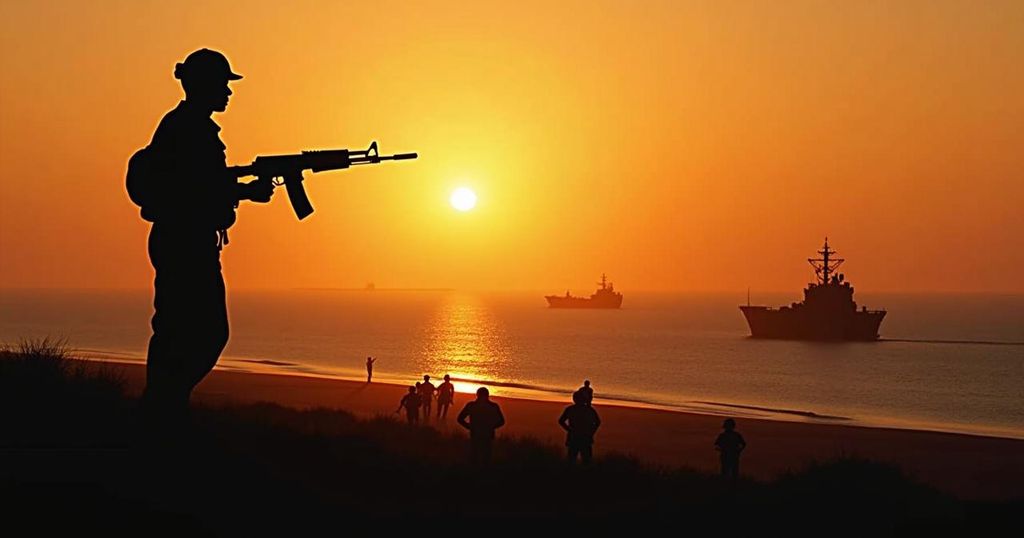Somalia’s President Hassan Sheikh Mohamud opposes Ethiopia’s military ambitions in the Red Sea, viewing a recent Ethiopia-Somaliland agreement as a direct challenge to Somalia’s sovereignty. Egypt’s support amplifies the regional tensions, raising fears of instability in the Horn of Africa amidst realignment of military alliances.
In a significant political development, President Hassan Sheikh Mohamud of Somalia has openly expressed his vehement opposition to Ethiopia’s recent strategic operations aimed at securing military access to the Red Sea. The President contends that Ethiopia’s actions extend beyond mere port accessibility, positing a more expansive ambition for military preeminence within the region. This opposition arises following a controversial agreement forged between Ethiopia and Somaliland, whereby Ethiopia is granted access to the Red Sea in return for acknowledging Somaliland’s sovereignty. Such a pact has incited alarm within Somalia, which views it as a blatant infringement on its territorial rights and integrity. The ramifications of this arrangement have reverberated throughout the diplomatic and military landscapes of the Horn of Africa. Alongside its allies, particularly Egypt, Somalia perceives this agreement as an act of expansionism on Ethiopia’s part, with the potential to destabilize regional stability. Egypt’s military support to Somalia further highlights the gravity of this situation, indicating a significant shift in the power dynamics of the area. President Mohamud has underscored apprehensions surrounding the strategic consequences of Ethiopia’s agreement. Critics interpret the deal as a maneuver to reshape the geopolitical milieu of a vital maritime corridor, triggering a state of alert within the Somali military and eliciting fears of a potential escalation of hostilities. Particularly alarming is Egypt’s declared readiness to deploy troops to Somalia following the conclusion of the African Union’s peacekeeping mission. Moreover, Ethiopia’s historical longing for sea access—lost after Eritrea became independent—and its recent military and economic alliances, including those with Turkey, suggest a broader realignment of allegiances that could have serious implications for Somalia’s security and stability. This geopolitical tension has attracted international scrutiny and intervention, with nations like China expressing support for Somalia’s claims to sovereignty. Somalia’s government has mobilized grassroots support against the Ethiopians’ actions, exemplified by large-scale protests in Mogadishu, while concurrently seeking to garner international condemnation of Ethiopia’s maneuvers. The unfolding situation underscores the delicate balance of power within the Horn of Africa and raises concerns about how such agreements might influence international maritime laws and security arrangements in a strategically significant region.
The ongoing tension between Somalia and Ethiopia is rooted in a historical quest for regional influence, particularly regarding access to the Red Sea. The recent agreement between Ethiopia and Somaliland, which effectively grants Ethiopia port access in exchange for recognition of Somaliland’s sovereignty, has exacerbated existing territorial disputes and led to significant unrest in Somalia. The strategic implications of Ethiopia’s maritime ambitions are viewed with anxiety by Somalia and its allies, particularly Egypt, given the history of conflict and competition for influence in the Horn of Africa. This situation reflects broader geopolitical contests that engage various international actors as they respond to shifting power dynamics.
In conclusion, Somalia’s staunch opposition to Ethiopia’s Red Sea military ambitions highlights critical geopolitical tensions in the Horn of Africa. With fears of territorial integrity at stake and the potential for increased military engagement, the situation warrants close international observation. The interplay of domestic unrest, regional alliances, and international responses will likely shape the narrative of security and stability in this strategically vital area for the foreseeable future.
Original Source: www.garoweonline.com







